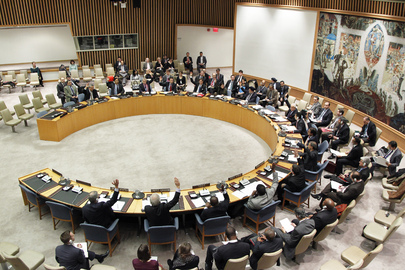Reviews: Thomas Nachbar on Executive Order 13567
Thomas B. Nachbar is a most remarkable law professor. A few years ago, after having achieved wide recognition as a senior University of Virginia scholar known for his work in technology and regulation, he joined the US Army Reserve as a judge advocate. Captain Nachbar works on detention and counterinsurgency law issues:
He is a judge advocate in the U.S.
Published by The Lawfare Institute
in Cooperation With

Thomas B. Nachbar is a most remarkable law professor. A few years ago, after having achieved wide recognition as a senior University of Virginia scholar known for his work in technology and regulation, he joined the US Army Reserve as a judge advocate. Captain Nachbar works on detention and counterinsurgency law issues:
He is a judge advocate in the U.S. Army Reserve, where, among other assignments, he was a principal editor and contributor for the first three editions of The Rule of Law Handbook: A Practitioners’ Guide (from 2007-09). He is currently assigned to the Office of the Judge Advocate General, International and Operational Law Division. In addition to his military service, he is a civilian senior adviser for the U.S. Department of Defense, Office of Rule of Law and Detainee Policy, and a senior fellow at the Center for National Security Law.Executive Order 13567, issued in March 2011, is titled "Periodic Review of Individuals Detained at Guantánamo Bay Naval Station Pursuant to the Authorization for Use of Military Force." The E.O. covers more than simply technical procedures for periodic review; an accompanying Fact Sheet offers the US government's view of how its internal detention law and policy interacts with international law of detention. In a new paper posted to SSRN, Professor Nachbar evaluates key aspects of domestic and international law by comparison to each other, and their interactions. It focuses particularly on certain international law aspects identified by the Fact Sheet, notably the fundamental guarantees of Article 75 of Additional Protocol I as well as Articles 4-6 of Additional Protocol II. Executive Order 13567: Executive Branch Policy Meets International Law in the Evolution of the Domestic Law of Detention (which is still in working draft and subject to revisions) has considerable practical importance for practitioners, government lawyers, and others seeking to elaborate the rationales of the US government's Fact Sheet, and to understand the larger picture of how the US government understands the law of detention, and its evolving interaction in domestic and international law.
The paper proceeds by describing the Order in detail and comparing the procedures adopted in the Order with those that proceeded it, namely the Combatant Status Review Tribunals and the Administrative Review Boards previously used for Guantanamo Bay detainees. The paper next analyzes the the Order’s procedures under Article 75 of Additional Protocol I and Articles 4-6 of Additional Protocol II, as suggested by the Fact Sheet. Finally, the paper considers the broader questions raised by the Order and Fact Sheet’s stated approach to the international law of detention. By recognizing an increased role for Additional Protocols I and II, the Order and Fact Sheet go some distance toward providing an avenue to the incorporation of international human rights norms into the U.S. domestic law of detention, an approach that sharply diverges with previous U.S. positions on the law of armed conflict.
Kenneth Anderson is a professor at Washington College of Law, American University; a visiting fellow of the Hoover Institution; and a non-resident senior fellow of the Brookings Institution. He writes on international law, the laws of war, weapons and technology, and national security; his most recent book, with Benjamin Wittes, is "Speaking the Law: The Obama Administration's Addresses on National Security Law."





